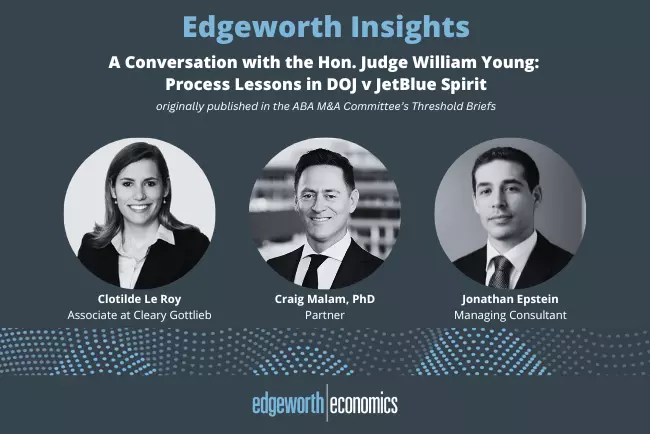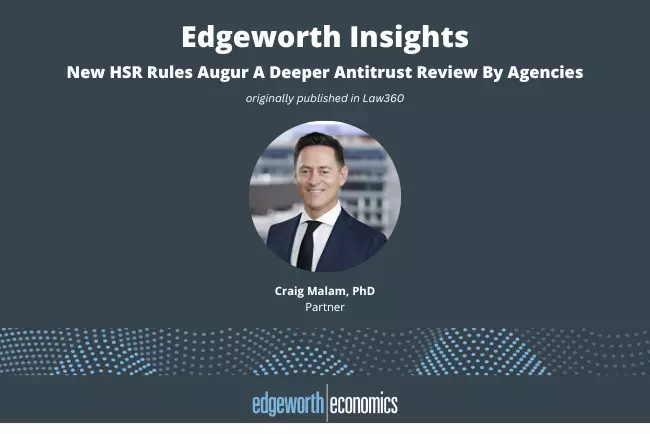Edgeworth Insights
- Blog, ABA Antitrust Section M&A Committee Threshold Briefs | 03.11.2025
On February 13, 2025, the Antitrust Law Section hosted a webinar with Judge William Young of the U.S. District Court for the District of Massachusetts. The webinar, titled Process Lessons in DOJ v JetBlue Spirit, was moderated by Dr. Craig Malam, Partner at Edgeworth Economics, and Clotilde Le Roy, Associate at Cleary Gottlieb Steen & Hamilton LLP.
- Blog, Law360 | 03.07.2025
This article will examine how the rule changes are to affect agency economists' analysis during the initial waiting period and the effect on how the agencies target or identify from among all notified transactions those that warrant in-depth reviews.
- Blog, Journal of Direct Selling Research | 01.24.2025
On April 30, 2024, the FTC published updated Business Guidance Concerning Multi-Level Marketing that details the current principles and practices that the FTC considers in its assessment of whether an MLM is offering an unlawful compensation structure and operating as a pyramid scheme.
- Law360 | 12.10.2024
In the November election, California voters narrowly rejected Proposition 32, which would have increased the state's minimum wage.
- Blog, CPI Antitrust Chronicle | 12.02.2024
This article explores the economic dynamics and competition issues within the fast-advancing Generative Artificial Intelligence (AI) industry. Generative AI, encompassing hardware, models, and applications, has seen rapid growth across sectors, offering potential for efficiency gains and innovation.
- Blog, 11.26.2024
Just over one year ago Governor Gavin Newsom signed a law that increased the minimum wage for limited-service restaurants in California, with at least 60 national locations, from $16 to $20 effective April 1, 2024. I estimate that the higher minimum wage has resulted in job losses of 9,600 to 19,300 in limited-service restaurants jobs, as of September 2024, six months after the $20 minimum wage took effect.
- Blog, ABA Antitrust Section's Economics Committee | 11.12.2024
“Dark patterns” is a term used to describe potentially deceptive app or website designs that could manipulate consumers to make choices they would otherwise not make.
- Blog, Competition Journal of the Antitrust and Unfair Competition Law Section of the California Lawyers Association | 10.23.2024
In class action litigation, a court’s decision as to whether a particular class should be certified turns, in part, on the question of predominance. In antitrust class actions in particular, the predominance assessment relies heavily on economic analysis.
- Blog, 09.04.2024
In late June 2024, a four-day bench trial was held in the U.S. District Court for the Northern District of Texas to determine if American Airlines had violated its duties to employees by allowing the asset managers of its employees’ 401(k) plans to pursue environmental, social and governance (“ESG”) goals.
- Blog, 08.22.2024
California’s minimum wage increased by 25% to $20 per hour on April 1 for limited-service restaurants with at least 60 locations in the U.S. Little attention has been paid to a part of the law that will cause thousands of managers in these businesses to lose their exempt status and may increase wage and hour lawsuits against these businesses.
- Blog, Law360 | 08.09.2024
On April 30, the FTC published updated business guidance concerning multilevel marketers, or MLMs. This 2024 guidance details the current principles and practices that the FTC claims to consider in its assessment of whether an MLM is offering an unlawful compensation structure and operating as a pyramid scheme.
- Blog, 07.31.2024
On April 1 the minimum wage in California increased by 25% to $20 per hour for limited-service restaurants with at least 60 locations in the U.S.
- Blog, 07.30.2024
Companies may be interested in assessing their compensation policies for a number of reasons. In a survey by the Society for Human Resource Management, three-quarters of firms responded that they regularly audit for pay equity across a variety of characteristics such as gender, race or ethnicity, and age.
- Blog, 06.24.2024
The recent 25% increase in California’s minimum wage from $16 to $20, for limited-service restaurants (including fast-food restaurants, coffee shops, and juice bars) with at least 60 locations nationwide, has sparked controversy.
- Blog, Law360 | 06.06.2024
In April, the U.S. Department of Labor issued its final overtime rule,under which the salary level for the white-collar Fair Labor Standards Act overtime exemption will be $1,128 per week, effective January 2025.
- Blog, ABA Antitrust Section Economics Committee | 05.16.2024
The ABA Antitrust Section’s 2024 Spring Meeting panel “Failure to Communicate? Improving Expert Testimony” provided a lively discussion about the evolving role of the expert witness, what makes an effective expert witness, and changing trends in trial procedure that may help streamline expert testimony.
- Blog, 05.15.2024
In the Final Rule “Defining and Delimiting the Exemptions for Executive, Administrative, Professional, Outside Sales, and Computer Employees” (Rule), the Department of Labor (DOL) dismisses concerns that the proposed mechanism for automatically updating the standard salary level will result in increases to the salary level above and beyond those related to wage growth.
- Blog, ABA Section of Antitrust Law | 05.14.2024
At the 72nd ABA Antitrust Spring Meeting panel “The Price is Right (Or Is It?),” panelists discussed concerns related to “dark patterns,” specifically focusing on pricing and disclosure practices such as “junk fees,” automatic renewals, and negative options.
- Blog, 05.07.2024
This article provides a preview of the range of H-2B wage increases mandated by the DOL. As explained in a recent analysis volatility in H-2B prevailing wages is caused by the DOL’s methodology and limited sample sizes, especially in less populated labor market areas, and may discourage employers from relying on the H-2B program.
- Blog, 05.01.2024
To comply with the Immigration and Nationality Act, the U.S. Department of Labor requires that H-2B visa workers, who are employed in less-skilled seasonal work, must be paid at least the prevailing wage for their occupation and work location.
- Blog, 04.29.2024
The use of economic analysis as a tool to assess issues in per se criminal antitrust violations has been a source of debate.
- 04.25.2024
The American Bar Association Labor and Employment Section held its annual Equal Employment Opportunity Law Conference in Boston from March 19 to March 22, 2024. Over 200 attendees took part in the four-day conference.


